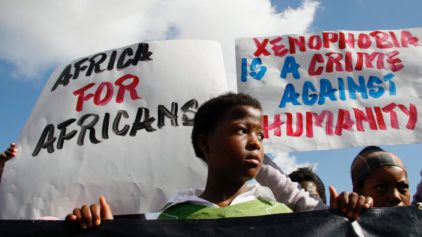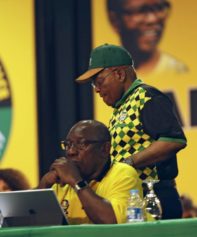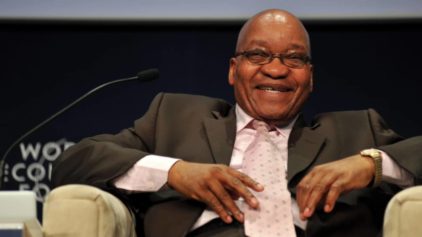
Outgoing President of the African National Congress (ANC), Jacob Zuma, listens as his successor, Cyril Ramaphosa, addresses delegates during the closing of the ANC’s elective conference in Johannesburg, Wednesday Dec. 20, 2017. (AP Photo/Themba Hadebe)
JOHANNESBURG (AP) — South Africa’s ruling African National Congress must end corruption “within our own ranks” as it faces its weakest point since taking power at the end of apartheid, the party’s new leader and the country’s likely next president said early Thursday.
Cyril Ramaphosa, once Nelson Mandela’s preferred successor, made his first speech as party leader while challenged with reviving one of Africa’s largest economies and the public’s trust in the ANC ahead of 2019 elections.
Anger has grown over multiple allegations of corruption against President Jacob Zuma, and some observers had said the choice of Zuma’s successor to lead the ANC could split Africa’s oldest liberation movement.
But Ramaphosa, South Africa’s deputy president and one of the country’s richest businessmen, proclaimed a “victory over the doomsayers.” The 65-year-old was chosen party leader on Monday in a close race against Nkosazana Dlamini-Zuma, a former chair of the African Union Commission and Zuma’s ex-wife.
“In recent times, we have seen the ANC at its worst. We have seen an organization divided against itself,” Ramaphosa told thousands of ruling party delegates.
“We are resolved to cast aside those attitudes and practices that have seen a gulf grow between those in public office and those they were elected to serve,” he said. “We are resolved to respect our people and earn their respect.”
He added, “we are alive, we are leading and we are here to stay.”
Ramaphosa will be the ANC’s candidate in the 2019 elections, which he is widely expected to win. Some observers have warned that if the party continues to lose support it could be forced into a governing coalition for the first time.
Critics in and out of the party have urged Ramaphosa to call on Zuma to step down as the country’s president to improve the ANC’s chances ahead of the 2019 vote. The ANC, which took power in 1994 in South Africa’s first democratic elections, had its worst showing at the polls last year when it lost key municipalities including commercial hub Johannesburg and the capital, Pretoria.
Instead, Ramaphosa thanked Zuma in his speech for his decade of leadership that included ensuring that South Africa’s antiretroviral program in the fight against AIDS became the largest in the world.
But Ramaphosa also made a plea for more “accountable leadership” after public frustration over alleged influence of Zuma and others by private business interests. Without naming names, he also despaired that corruption has cost South Africa billions of dollars and further impoverished the country’s people.
Ramaphosa’s slim margin this week by less than 200 votes, and the fact that half of the ANC’s top leadership is now comprised of staunch Zuma allies could complicate his promises to unite the deeply divided party and usher in reforms to South Africa’s economy and governance.
The new ANC leader said the party will continue to focus on eradicating poverty and unemployment that is near 30 percent and pursue its policy of “radical economic transformation” aimed at reducing the lingering inequalities created under apartheid.
Land reform is the first key decision agreed on by the party’s new leaders.
“This conference has resolved that the expropriation of land without compensation should be among the mechanisms available to the government to give effect to land reform and redistribution,” Ramaphosa said, but he warned that “we must ensure that we do not undermine the economy, agricultural production and food security.”


